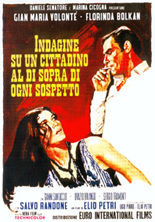
 “How are you going to kill me this time?” she asks teasingly, as she takes her lover into her arms.
“How are you going to kill me this time?” she asks teasingly, as she takes her lover into her arms.
“I’m going to slash your throat,” he answers his mistress, welcoming the embrace.
As they undress and slide under the silk sheets, he makes good on his playful threat. That the man actually kills her is one shock. That he is also the chief of the police’s homicide division is another.
Never named, the inspector (Gian Maria Volonté, A Fistful of Dollars) is worshipped by the officers below him, whereas they view the deceased Miss Terzi (Floridan Bolkan, A Lizard in a Woman’s Skin) as “a libertine” for owning no undergarments. Then again, Investigation of a Citizen Above Suspicion takes place in an era when Italy kept secret files on homosexuals and communists alike, which the inspector lords over as potential blackmail material, so the authorities are all about snap judgments.
 Preaching precision and repression, he embarks on the investigation of Terzi’s murder despite being the crime’s perpetrator. He even leaves a slew of clues at the scene that point directly to him. Why? He feels he is so above the law, he never could be taken seriously as a suspect. He even informs his superior of his affair with the woman.
Preaching precision and repression, he embarks on the investigation of Terzi’s murder despite being the crime’s perpetrator. He even leaves a slew of clues at the scene that point directly to him. Why? He feels he is so above the law, he never could be taken seriously as a suspect. He even informs his superior of his affair with the woman.
Investigation is not your ordinary Italian thriller, and not just because it won the Academy Award that year for Best Foreign Language Film. It is built with a heavy streak of political satire, some of which may be lost on American viewers, but hardly to a point of indifference; the mystery of the inspector’s mental state is too great a pull, and director Elio Petri (The 10th Victim) parcels out explanatory bits during many flashbacks.
Technically, the movie is imperfect — the camera shakes in the pivotal moments right after the crime, and later, the crew clearly is reflected in our antihero’s sunglasses — but all that can be overlooked with ease because its plot is so unique, even several decades after the fact. Sporting the bounce of a plucked rubber band, Ennio Morricone’s equally first-rate theme strongly hints at Petri’s playful intent, dark though it may be, dark it should be. —Rod Lott
